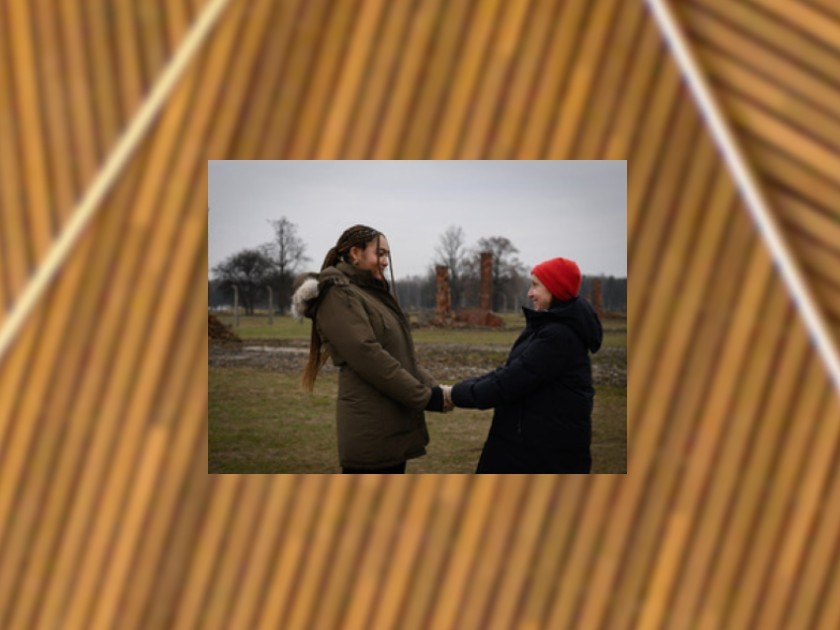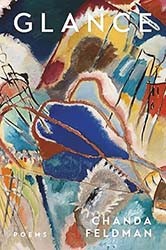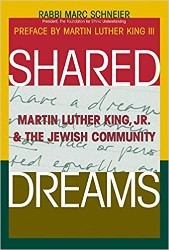
From right to left, Eva and Naomi Umlauf
Photo by Alessandra Schellnegger
From a young age, I knew that my Oma was a survivor. My parents instilled in my sister and me an awareness that we had the blood of survivors running through our veins from both sides of our family: Holocaust survivors on one side and, on the other, slaves and those who endured the Jim Crow South. Although I knew the broad contours of my Oma’s story — and had often glimpsed the numbers tattooed on her arm — she shared few details of her experiences. I held back many times from asking questions, out of fear that I would dredge up painful memories. When my Oma decided to tell her story fully in this book, I realized how critical her history would be to me as I seek to understand my own identity and place in the world.
People have at times presumed that my identity as the granddaughter of a Holocaust survivor is at odds with my being Black, Christian, and American. Such external perceptions seek to insert differences that do not reflect my or my family’s lived reality. Nor do barriers in communication between German and English and the ocean that separates us from my Oma define or create distance in our loving relationship. Though I recognize the enormous historical significance of this translation as part of broader efforts to bear witness to the stories of survivors, for me this memoir is a deeply personal text, and as I read its words, I feel I am engaging in intimate conversation with my Oma. I remember how my mom always said that, though my Oma’s eyes are blue and mine are brown, we share the same heart-shaped face. In this book, I see her face mirrored in mine, my story etched between the lines of hers.
One moment in the memoir stands out in a very significant way for me. As my Oma discusses not knowing whether my grandfather Jakob had received a tattoo during his internment in multiple concentration camps, she writes, “Did he have a number? I can’t say for certain: It wasn’t apparent to me back then. But his arms were covered in silky black hair that I caressed without looking for a number underneath.” To me, this is the most beautiful moment in the text. It reveals the ways that, despite painful memories, my Oma has always managed to provide love and comfort — in our case crossing the ocean for graduations, birthdays, and Thanksgiving. And though she was not able to speak about the Holocaust with my grandfather, she shared her life and love with him.
That my grandmother in later life summoned the courage required to tell her story has shown me the power of using one’s voice and one’s story to build connection, promote understanding, and combat the bigotry and hatred that rest on the fear of, and the inability to see ourselves in, the Other. Learning through the lens of her story has deepened my own passion to fight injustice in its many forms. Although the experiences and struggles of Jews and African Americans are distinct, their shared experience as victims of horrific oppression and unspeakable inhumanity has inspired both communities to work in solidarity to obtain justice. There is a long and storied history of Black and Jewish activism on civil rights and human rights issues. Stories like my Oma’s tap into our common humanity and help us understand in a uniquely personal way the dire individual and generational consequences of allowing bigotry and hate to fester and root themselves in our hearts and our societies. The power of telling one’s own story is among the greatest lessons my grandmother taught me; and the legacy, from both sides of my family, of resilience, courage, ingenuity, creativity, and most of all, compassion and understanding will continue to inspire me to do my part, whether in small ways or large, to make my world kinder, gentler, and more just.
The Afterword for The Number on Your Forearm is Blue Like Your Eyes by Eva Umlauf (May 7, 2024; Mandel Vilar and Dryad Press) was written by Naomi Umlauf, Eva’s granddaughter.



